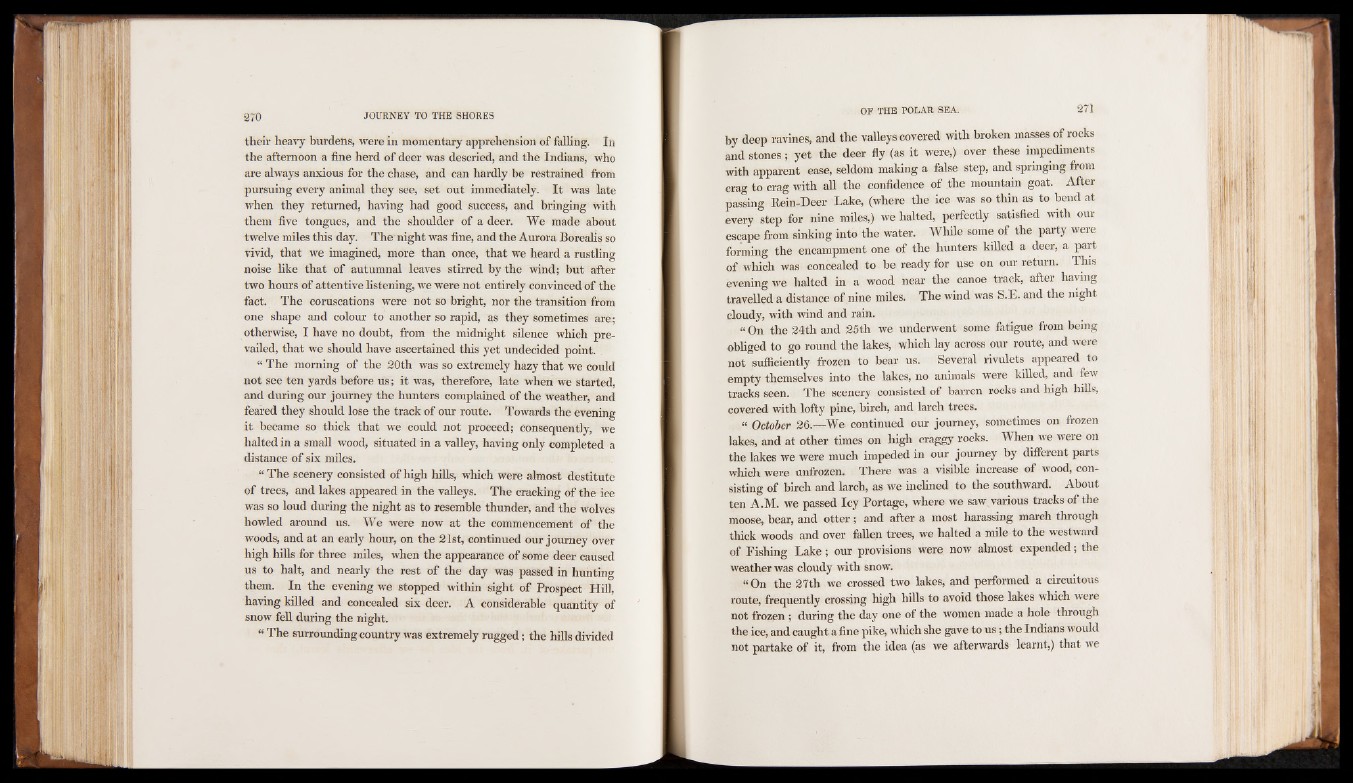
270 JOURNEY TO THE SHORES
their heavy burdens, were in momentary apprehension of falling. In
the afternoon a fine herd of deer was descried, and the Indians, who
are always anxious for the chase, and can hardly be restrained from
pursuing every animal they see, set out immediately. It was late
when they returned, having had good success, and bringing with
them five tongues, and the shoulder of a deer. We made about
twelve miles this day. The night was fine, and the Aurora Borealis so
vivid, that we imagined, more than once, that we heard a rustling
noise like that of autumnal leaves stirred by the wind; but after
two hours of attentive listening, we were not entirely convinced of the
fact. The coruscations were not so bright, nor the transition from
one shape and colour to another so rapid, as they sometimes are;
otherwise, I have no doubt, from the midnight silence which prevailed,
that we should have ascertained this yet undecided point.
“ The morning of the 20th was so extremely hazy that we could
not see ten yards before us; it was, therefore, late when we started,
and during our journey the hunters complained of the weather, and
feared they should lose the track of our route. Towards the evening
it became so thick that we could not proceed; consequently, we
halted in a small wood, situated in a valley, having only completed a
distance of six miles.
“ The scenery consisted of high hills, which were almost destitute
of trees, and lakes appeared in the valleys. The cracking of the ice
was so loud during the night as to resemble thunder, and the wolves
howled around us. W e were now at the commencement of the
woods, and at an early hour, on the 21st, continued our journey over
high hills for three miles, when the appearance of some deer caused
us to halt, and nearly the rest of the day was passed in hunting
them. In the evening we stopped within sight of Prospect Hill,
having killed and concealed six deer. A considerable quantity of
snow fell during the night.
“ The surrounding country was extremely rugged; the hills divided
by deep ravines, and the valleys covered with broken masses of rocks
and stones; yet the deer fly (as it were,) over these impediments
with apparent ease, seldom making a false step, and springing from
crag to crag with all the confidence of the mountain goat. After
passing Kein-Deer Lake, (where the ice was so thin as to bend at
every step for nine miles,) we halted, perfectly satisfied with our
escape from sinking into the water. While some of the party were
forming the encampment one of the hunters killed a deer, a part
of which was concealed to be ready for use on our return. This
evening we halted in a wood near the canoe track, after having
travelled a distance of nine miles. The wind was S.E. and the night
cloudy, with wind and rain.
“ On the 24th and 25th we underwent some fatigue from being
obliged to go round the lakes, which lay across our route, and were
not sufficiently frozen to bear us. Several rivulets appeared to
empty themselves into the lakes, no animals were killed, and few
tracks seen. The scenery consisted of barren rocks and high hills,
covered with lofty pine, birch, and larch trees.
“ October 26.—We continued our journey, sometimes on frozen
lakes, and at other times on high craggy rocks. When we were on
the lakes we were much impeded in our journey by different parts
which were unfrozen. There was a visible increase of wood, consisting
of birch and larch, as we inclined to the southward. About
ten A.M. we passed Icy Portage, where we saw various tracks of the
moose, bear, and otter; and after a most harassing march through
thick woods and over fallen trees, we halted a mile to the westward
of Fishing Lake; our provisions were now almost expended; the
weather was cloudy with snow.
“On the 27th we crossed two lakes, and performed a circuitous
route, frequently crossing high hills to avoid those lakes which were
not frozen ; during the day one of the women made a hole through
the ice, and caught a fine pike, which she gave to u s; the Indians woidd
not partake of it, from the idea (as we afterwards learnt,) that we